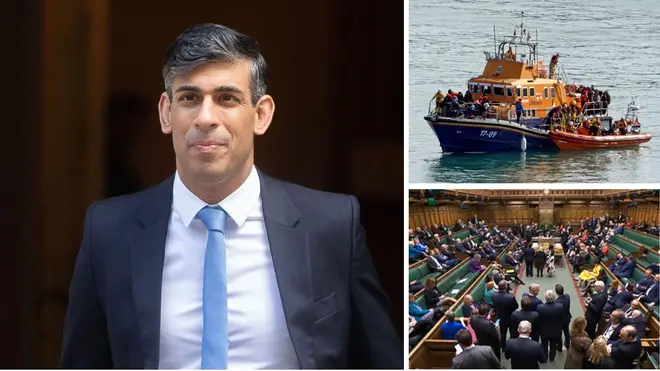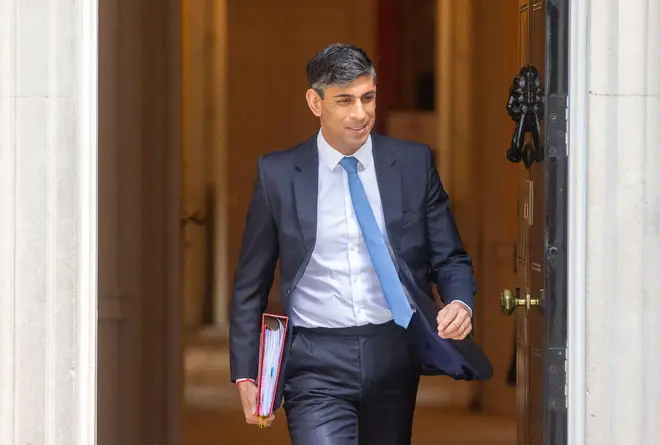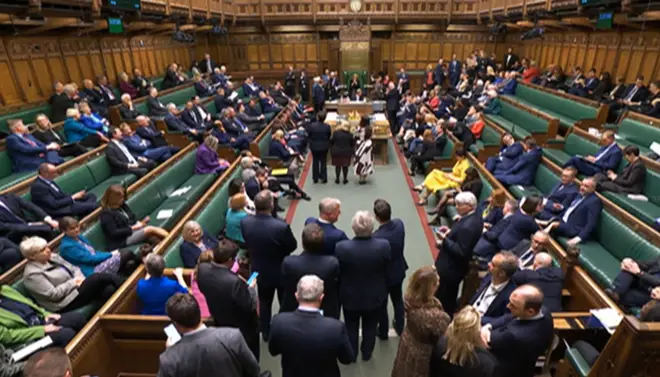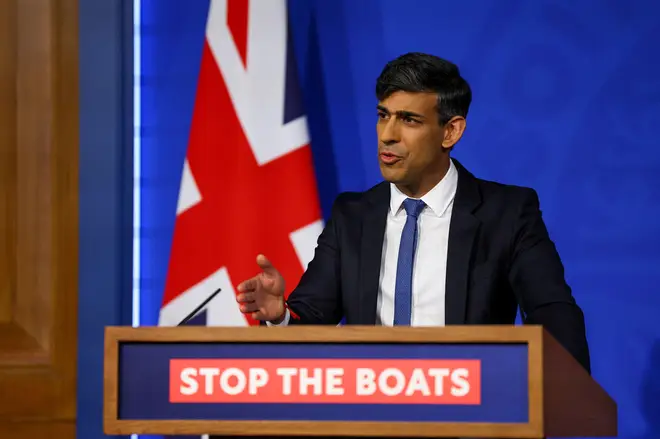
Paul Brand 3pm - 6pm
23 April 2024, 00:33 | Updated: 23 April 2024, 01:16

The Rwanda Bill will become law in a major victory for Rishi Sunak after it was finally passed by the House of Lords with no further amendments on Monday evening.
The Prime Minister’s emergency legislation was passed through the Lords after a drawn-out evening of parliamentary ping pong on Monday.
It followed weeks of parliamentary deadlock between the Lords and Commons, as Mr Sunak vowed to end the ping pong for good and insisted the legislation would be passed through that same evening with “no ifs, no buts”.
The bill is intended to overcome the objections of the Supreme Court by forcing judges to treat Rwanda as a safe country for asylum seekers and allowing ministers to ignore emergency injunctions from the European Court of Human Rights.
In its final parliamentary round, the Lords won a concession from the government which sought to ensure asylum seekers who had worked with the British armed forces abroad were not deported to Rwanda.
In a bid to see the legislation through, the government promised to re-evaluate any rejected claims of those from Afghanistan under the Afghan Relocations and Assistance Policy (ARAP) scheme.

After whittling down the initial list of amendments to just one, cross-bencher Lord Anderson conceded it was time to back down on Monday evening.
MPs had rejected an amendment from the Lords detailing that Rwanda could not be treated as safe until an independent monitoring body declared it so, as the government declared it "almost identical" to the previous ones overturned.
Lord Anderson said that while some may have “wished us to keep on fighting” there was little point in doing so.
"The time has come to accept the primacy of the elected house and withdraw from the fray," he told the House of Lords.
The bill will now head for Royal Assent and then officially become law.

The Rwanda plan 'will work' says former Chief Immigration Officer
Home Secretary James Cleverly praised the bill's success on Monday as a "landmark moment in our plan to stop the boats".
In a video posted to social media, he said: "The Safety of Rwanda Bill has passed in Parliament and it will become law within days.
"The Act will prevent people from abusing the law by using false human rights claims to block removals. And it makes clear that the UK Parliament is sovereign, giving Government the power to reject interim blocking measures imposed by European courts.
"I promised to do what was necessary to clear the path for the first flight. That's what we have done.
"Now we're working day in and day out to get flights off the ground."
However, human rights groups have condemned the legislation as a "breach of international law".
The charity Freedom from Torture, alongside Amnesty International and Liberty, warned the bill poses "a significant threat to the rule of law" by undermining what protects people from an abuse of power by the state, and described Parliament as a "crime scene".
The Safety of Rwanda Bill has just passed in Parliament.
— James Cleverly🇬🇧 (@JamesCleverly) April 22, 2024
This is what it means 👇 pic.twitter.com/Nq3O9qKVus
It comes after Rishi Sunak insisted earlier on Monday that the first deportation flights to Rwanda will leave "in 10 to 12 weeks”.
Mr Sunak told reporters that the government has "an airfield on standby and booked commercial charter planes".
"No ifs, not buts, these flights are going to Rwanda," he said.
He indicated that once the programme in up and running the planes there will be a "regular rhythm" of flights heading to Kigali.
Mr Sunak said on Monday: "Enough is enough. No more prevarication, no more delay. Parliament will sit there tonight and vote no matter how late it goes. No ifs, no buts. These flights are going to Rwanda.

"Describing the plan as an 'indispensable deterrent so that we finally break the business model of the criminal gangs and save lives.
"Starting from the moment that the bill passes, we will begin the process of removing those identified for the first flight. We have prepared for this moment."
Mr Sunak's televised address came hours before the parliamentary showdown on his flagship policy to stop the boats.
He vowed last week that Monday would be the day the bill finally got through parliament, telling reporters there would be "no more prevarication, no more delay".
He said both houses would sit as late into the night as needed to agree a version of the bill to pass into law.
Mr Sunak told the press conference on Monday: "To detain people while we prepare to remove them, we've increased detention spaces to 2,200. To quickly process claims, we've got 200 trained, dedicated caseworkers ready and waiting.
"To deal with any legal cases quickly and decisively, the judiciary have made available 25 courtrooms and identified 150 judges who could provide over 5,000 sitting days.
"The Strasbourg court has amended their rule 39 procedures in line with the test set out in our Illegal Migration Act. And we've put beyond all doubt that ministers can disregard these injunctions with clear guidance that if they decide to do so, civil servants must deliver that instruction and most importantly, once the processing is complete, we will physically remove people.
"And to do that, I can confirm that we've put an airfield on standby, booked commercial charter planes for specific slots and we have 500 highly trained individuals ready to escort illegal migrants all the way to Rwanda, with 300 more trained in the coming weeks.
"This is one of the most complex operational endeavours the Home Office has carried out. But we are ready, plans are in place and these flights will go, come what may.
"No foreign court will stop us from getting flights off."

Peers have repeatedly blocked the legislation with a series of amendments, stretching debate on the "emergency legislation" over more than four months and delaying flights taking asylum seekers to Rwanda.
Downing Street is hostile to the idea of making concessions to secure the passage of the bill, leading to a deadlock with the Lords.
The bill is intended to overcome the objections of the Supreme Court by forcing judges to treat Rwanda as a safe country for asylum seekers and allowing ministers to ignore emergency injunctions from the European Court of Human Rights.
Mr Sunak has already expressed his frustration, saying last week his patience with those blocking the bill had "run thin", adding: "No more prevarication, no more delay. We will sit there and vote until it's done."
Last week saw peers amend the bill yet again to include an exemption for Afghan nationals who assisted British troops and a provision meaning Rwanda could not be treated as safe unless it was deemed so by an independent monitoring body.
Crossbench peer and former independent reviewer of terrorism legislation Lord Anderson has raised this possibility and described the legislation as a "post-truth bill" that asks Parliament to declare Rwanda is safe when, he argued, it is not.